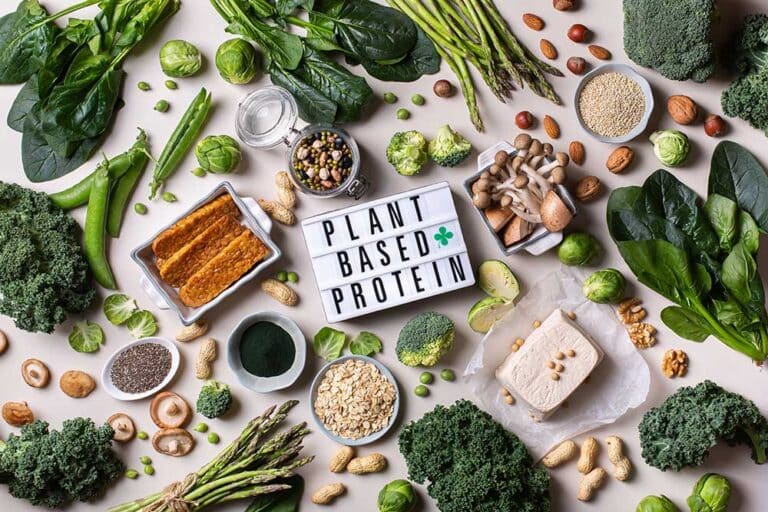The Basics of Plant-Based Diets
History and Components
Plant-based diets have a rich history, dating back to ancient Greece. This dietary approach is often associated with Pythagoras, who reportedly feasted on vegetables, bread, and honey (Mayo Clinic Press). Today, a plant-based diet encompasses consuming a variety of plant-derived foods, including fruits, vegetables, whole grains, nuts, seeds, and legumes. There are various forms of plant-based diets, from vegan to vegetarian and even flexitarian options.
Protein in Plant-Based Diets
One of the common concerns for individuals transitioning to a plant-based diet is whether they can consume enough protein. It is entirely possible to meet protein needs on a plant-based diet. Essential components of this diet include beans, lentils, and other plant sources like fruits and vegetables.
The recommended protein intake is approximately 50 grams a day or having protein constitute 10-35% of your daily calorie intake. To ensure sufficient protein, consider including high-protein plant-based foods in your daily meals. For more information and examples, see our guide on high protein plant-based foods.
| Food Source | Protein Content (per 100g) |
|---|---|
| Lentils | 9g |
| Chickpeas | 19g |
| Tofu | 8g |
| Quinoa | 4g |
| Almonds | 21g |
A well-rounded plant-based diet ensures that you get a variety of nutrients while reaping the benefits of plant-based eating for optimal health. For beginners, a helpful resource is our article on how to start a plant-based diet, providing tips for a successful transition.
If you want to explore more about recipes or meal plans for a plant-based lifestyle, check out our sections on plant-based diet recipes and plant-based diet meal plan.
Health Benefits of Plant-Based Diets
Reduced Risk of Chronic Diseases
Plant-based diets have been linked to a reduced risk of several chronic diseases. These include coronary heart disease, high blood pressure, and diabetes. Research by Harvard Health Publishing supports the notion that vegetarian diets promote health by lowering the risk of these conditions, as well as potentially increasing longevity.
| Health Condition | Impact of Plant-Based Diet |
|---|---|
| Coronary Heart Disease | Lowered Risk |
| High Blood Pressure | Lowered Risk |
| Diabetes | Prevention and Management |
| Obesity | Weight Loss, Approx. 1 lb/week |
Studies also indicate that vegans and vegetarians have lower rates of obesity. As noted by The Permanente Journal, weight loss in vegetarians is suggested to occur at approximately one pound per week. Moreover, a vegan or vegetarian diet can be highly effective for weight management. Plant-based diets help in improving insulin sensitivity and decreasing insulin resistance, contributing to the prevention and treatment of diabetes.
These diets provide essential nutrients such as protein, fats, carbohydrates, vitamins, and minerals, along with higher fiber and phytonutrient content. However, vegans may require a vitamin B12 supplement.
For more details on how plant-based eating can specifically aid with weight loss, visit our section on plant-based diet and weight loss.
Support from Health Experts
Numerous health experts and doctors advocate for plant-based diets, citing their benefits in reducing all-cause mortality, which refers to death from all causes (MedicineNet). Many health professionals recommend plant-based eating due to its comprehensive nutritional profile and benefits.
By adopting a plant-based diet, individuals can access all essential nutrients required for optimal health. This includes protein, fats, carbohydrates, vitamins, and minerals along with the additional benefit of higher fiber and phytonutrient content.
| Nutrient | Availability in Plant-Based Diets |
|---|---|
| Protein | Abundant |
| Fats | Available |
| Carbohydrates | Plentiful |
| Vitamins | Comprehensive, except B12 (may need supplement) |
| Minerals | Extensive |
| Fiber | High |
| Phytonutrients | High |
In addition, plant-based diets can aid in reducing healthcare costs by lowering the incidence of chronic diseases. Given this support from the medical community, transitioning to a plant-based diet has never been more appealing, especially for those seeking to improve their overall health and wellness.
For more insights on incorporating plant-based eating into your life, check out our guides on plant-based diet for beginners and how to start a plant-based diet.
With the myriad of health advantages, plant-based dietary choices are not just a trend but a genuine pathway to enhanced well-being. Explore more benefits of plant-based eating on our dedicated page benefits of plant-based eating.
Challenges of Plant-Based Diets
Nutrient Considerations
Following a plant-based diet can offer numerous health benefits (benefits of plant-based eating), but it also presents some nutritional challenges that need to be addressed for optimal well-being.
Individuals on a plant-based diet might find it difficult to obtain sufficient amounts of certain nutrients, such as Vitamin B12, iron, calcium, Vitamin D, and Omega-3 fatty acids. These nutrients are often found in higher concentrations in animal products and may be less bioavailable in plant-based sources.
To combat these challenges, it’s important to consider:
- Vitamin B12: Found primarily in animal products, a deficiency in Vitamin B12 can lead to severe neurological issues. Vegans should consider supplements or fortified foods to meet their B12 needs (Harvard Health Publishing).
- Iron: While plant-based sources of iron (non-heme iron) are abundant, they are less easily absorbed by the body than heme iron found in animal products. Consuming vitamin C alongside iron-rich foods, such as spinach or lentils, can boost non-heme iron absorption (Harvard Health Publishing).
- Calcium and Vitamin D: Ensuring adequate calcium intake is essential for strong bones. Vegans can obtain calcium from fortified plant milks, tofu, and leafy greens, but might need Vitamin D supplements to aid absorption and maintain bone health.
- Omega-3 Fatty Acids: Essential for heart and brain health, Omega-3s are found in high amounts in fish. Plant-based sources include flaxseeds, chia seeds, and walnuts, but they provide a less potent form of Omega-3s. Supplements like algal oil can be an effective alternative (Harvard Health Publishing).
| Nutrient | Plant-Based Sources | Supplements or Fortified Foods |
|---|---|---|
| Vitamin B12 | N/A | Fortified cereals, nutritional yeast, pills |
| Iron | Lentils, Spinach | Iron supplements |
| Calcium | Tofu, Leafy Greens | Fortified plant milks |
| Vitamin D | N/A | Vitamin D supplements, fortified foods |
| Omega-3 Fatty Acids | Flaxseeds, Walnuts | Algal oil supplements |
Risks of Deficiencies
A plant-based diet can offer extensive health benefits when balanced correctly, but if not managed well, it can lead to potential deficiencies and health risks.
- Inadequate Protein: Plant-based eaters may struggle with inadequate protein intake, which can be overcome by incorporating a variety of high-protein plant foods such as beans, lentils, tofu, and quinoa. For more insights, check high protein plant-based foods.
- Bone Health: Some studies suggest that those on a vegan diet may have an increased risk of fractures due to insufficient calcium intake. Ensuring adequate intake of calcium and Vitamin D can mitigate this risk.
- Hemorrhagic Stroke: There’s some evidence pointing to a slight increased risk of hemorrhagic stroke among vegetarians and vegans, though more research is needed in this area (MedicineNet).
- Highly Processed Foods: Consuming a plant-based diet rich in highly processed foods may not confer the same health benefits as a whole foods plant-based diet. Unhealthy plant-based diets can still pose risks of heart disease similar to omnivorous diets (MedicineNet).
By carefully planning their diet and possibly incorporating supplements or fortified foods, individuals can successfully navigate these nutrient hurdles and fully reap the plant-based diet benefits. Further tips for beginners can assist individuals in making a smooth transition to a plant-based lifestyle.
Variations of Plant-Based Diets
Understanding the different variations of plant-based diets can help individuals select an approach that best aligns with their needs and preferences. Each type offers unique benefits and considerations.
Vegetarian Options
Vegetarian diets come in many variations, allowing individuals to choose the version that best suits their lifestyle and dietary preferences (Harvard Health Publishing). Common vegetarian options include:
Lacto-Vegetarian: This diet excludes meat, fish, poultry, and eggs but includes dairy products such as milk, cheese, and yogurt.
Ovo-Vegetarian: This diet excludes meat, fish, poultry, and dairy products but includes eggs.
Lacto-Ovo Vegetarian: This diet excludes meat, fish, and poultry but includes both dairy products and eggs.
Pesco-Vegetarian: Also known as pescatarian, this diet excludes meat and poultry but includes fish and other seafood, along with dairy and eggs.
| Vegetarian Option | Includes | Excludes |
|---|---|---|
| Lacto-Vegetarian | Dairy products | Meat, fish, poultry, eggs |
| Ovo-Vegetarian | Eggs | Meat, fish, poultry, dairy |
| Lacto-Ovo Vegetarian | Dairy, eggs | Meat, fish, poultry |
| Pesco-Vegetarian | Fish, seafood, dairy, eggs | Meat, poultry |
Flexibility and Preferences
A plant-based diet does not have to be strictly vegetarian or vegan. It primarily includes food made of plants like fruits, vegetables, nuts, seeds, whole grains, and legumes (Columbia University Irving Medical Center). However, the diet allows for moderate consumption of animal products such as poultry, beef, eggs, fish, and dairy.
The Mediterranean diet is one example of a flexible plant-based diet, which incorporates fish, poultry, eggs, cheese, and yogurt. This diet has been shown to reduce the risk of heart disease, metabolic syndrome, diabetes, and certain cancers (Harvard Health Publishing).
Flexitarian Diet: This approach is mostly plant-based but includes occasional consumption of meat and other animal products. It offers a balance between plant-based eating and flexible dietary choices.
Vegan Diet: This stricter version excludes all animal products, including meat, dairy, eggs, and honey.
The flexibility of these diets allows individuals to find a balance that works for their nutritional needs and lifestyle preferences. For beginners looking to ease into these dietary changes, our guide on how to start a plant-based diet offers practical tips and advice.
By choosing a variation that suits their needs, individuals can enjoy the benefits of plant-based eating while accommodating their preferences. Access to diverse plant-based diet recipes and meal plans can also support the transition and sustainability of the diet.
For those looking for guidance on protein intake, our article on high protein plant-based foods and plant-based diet protein sources offers valuable information on meeting protein requirements. Additionally, athletes can explore the specific benefits and recommendations in our plant-based diet for athletes section.
Transitioning to a Plant-Based Diet
Switching to a plant-based diet can be both an exciting and daunting journey. Here are some practical tips and strategies for making a smooth transition and maintaining the lifestyle.
Tips for a Smooth Transition
Transitioning to a plant-based diet may not be easy and can be a challenge, but the right approach, rather than sheer willpower, is essential for success (No Meat Athlete). Here are a few tips to ease into this dietary shift:
- Gradual Elimination: Start by gradually eliminating certain foods while increasing your intake of plant-based foods. This approach helps your body and mind adjust seamlessly.
- Plan Ahead: Prepare your meals in advance to avoid last-minute processed food choices. Consider following a plant-based diet meal plan.
- Healthy Food Environment: Remove animal-based and processed foods from your pantry. Stock up on whole grains, vegetables, fruits, and high-protein plant-based foods.
- Incremental Shifts: Each meal or snack should consist of 2/3 plants and no more than 1/3 animal product, suggesting a gradual dietary shift toward more plant-focused meals.
- Eat Out Smart: Identify plant-friendly restaurants in your area to ensure you have good options when dining out.
Maintaining a Plant-Based Lifestyle
Once you have transitioned to a plant-based diet, maintaining this lifestyle requires consistency and motivation. Here are some useful strategies:
- Create Supporting Habits: Regular exercise and activities like meditation can enhance the health benefits of a plant-based diet and improve its sustainability (No Meat Athlete).
- Variety in Diet: Keep your meals diverse to avoid monotony and ensure you get a broad spectrum of nutrients.
- Stay Informed: Keep learning about the benefits of plant-based eating and plant-based diet protein sources to stay motivated.
- Track Your Nutrient Intake: Use monitoring tools or apps to track your daily intake and ensure you’re meeting your nutritional needs.
- Community and Support: Engage with online communities or local groups that focus on plant-based living for support and recipe ideas. Check out our section on plant-based diet recipes.
By following these guidelines and being patient with yourself, transitioning and maintaining a plant-based lifestyle can be rewarding both for your health and the environment. For those starting afresh, read how to start a plant-based diet for beginners, and for athletes, explore the plant-based diet for athletes.
Environmental Impact of Plant-Based Diets
Opting for a plant-based diet not only offers numerous health benefits but also makes a significant positive impact on the environment. Let’s explore the sustainability benefits and how this dietary shift contributes to emission reduction.
Sustainability Benefits
Transitioning to a plant-based diet can contribute to substantial sustainability gains. Plant-based foods generally require fewer resources to produce compared to animal products. This means less water usage, reduced land deforestation, and a lower overall environmental footprint.
Here are some key benefits:
- Reduction in Resource Consumption: Plant-based foods like pulses, nuts, fruits, and vegetables typically use fewer natural resources than meat and dairy products.
- Lower Environmental Footprint: By consuming more plant-based options, individuals can help minimize the negative environmental impacts linked to animal farming, such as habitat destruction and water contamination.
Contributing to Emission Reduction
One of the most compelling environmental arguments for a plant-based diet is its potential to significantly decrease greenhouse gas emissions. Food production is a major contributor to global emissions, and plant-based diets represent a more sustainable dietary pattern.
Consider the following data:
| Source | Percentage of Global Greenhouse Gas Emissions |
|---|---|
| Plant-Based Foods | 29% |
| Meat and Dairy Products | 57% |
Animal products, particularly beef and dairy, have a high greenhouse gas emission footprint compared to plant-based alternatives. According to PCRM:
- A global shift to plant-based diets could reduce greenhouse gases from food production by 70% by 2050.
- The methane emissions from five major meat corporations and ten top dairy corporations make up over 80% of the European Union’s total methane footprint.
Substituting animal products with plant-based options can effectively lower these emissions. For instance, replacing beef with beans in the diet could contribute to 46-74% of the United States’ targeted greenhouse gas emission reductions.
By embracing a plant-based lifestyle, individuals can not only improve their own health but also play a crucial role in protecting the planet. For more information on how to begin this journey, check out our guide on how to start a plant-based diet and our plant-based diet meal plan.
- About the Author
- Latest Posts
Johnnie D. Jackow Sr., the founder and CEO of Total Body Fitness, Worldwide, has a long-standing career in the fitness industry. He began as a certified personal trainer in the mid-90s and soon after authored his first weight loss book in 1998. This led to the launch of Total Body Fitness, Nationwide in the USA at the same time. Johnnie gained recognition as the fitness guru of his time, running infomercials on local TV late at night in Houston, Texas. Over the years, he has helped more than 40,000 individuals from all over the world achieve their health and fitness goals. With over 60,000 hours of documented training in integrative functional medicine, he completed his PhD in human physiology in 2010. His primary objective is to assist people in reaching their health and fitness goals through alternative approaches rather than relying solely on conventional medicine and pharmaceutical drugs. Today, with almost three decades of experience under his belt, Johnnie continues to be a leader in health and fitness.








